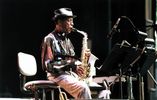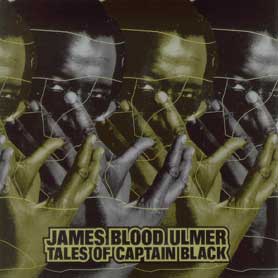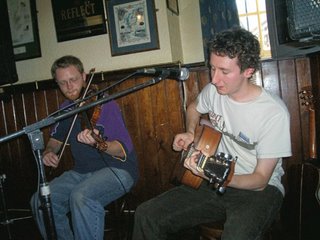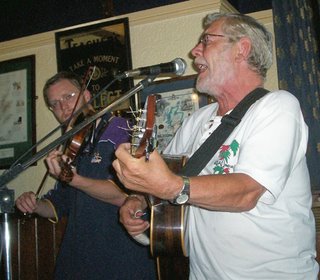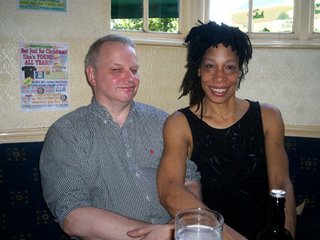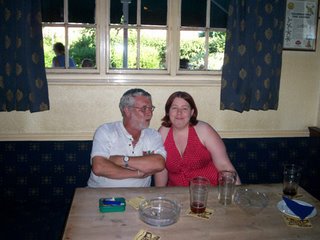
Art Blakey... I was sat in a rather wonderful new bar bistro place in God's Little Acre called Goodliffes a couple of days ago with my collaborator Murray discussing future plans (given my ongoing health problems, somewhat narrowed down and more targeted...) when he mentioned how much he liked Art Blakey. At first I misheard and thought he was referring to a character in the old and late-lamented (by the perverse) British sitcom , 'On the Buses' - (Blakey: 'I 'ate you, Butler')... a momentary slip. A little while later 'Moanin' by one of the classic (Art) Blakey lineups came on the sound system (I said this place is wonderful...) – so you can't fight these things...
I saw (Art) Blakey at a festival just down the road about twenty years ago and he was awesome – an old guy with a shock of white hair who tottered on stage – and when he hit his drums it was like tectonic plates moving in the earth – incredible power. Blakey was generally regarded as the best drummer to play behind Thelonious Monk – so here are two selections from their shared album, recorded in 1958. This is the Jazz Messengers with Monk taking the piano chair – front line speed tenor man Johnny Griffin had also played with Monk in his quartet. Blakey ushers in 'Evidence' – that tricky, rather ominous Monk theme. Bill Hardman solos first, over Monk's elliptical comping that disappears abruptly then suddenly plonks a triplet or a chordal marker/phrase down. Monk takes a minimal solo – more an exercise in silence in between a few scattered phrases. Griffin fleet through the changes as ever, Monk more in evidence (ho ho) behind him than he was with Hardman. Blakey enters quietly, slowly building – an exercise in dynamics – he wasn't always battering the life out of his drums. Creating a solo over the constancy of his ticking hi hat that erupts into brilliance. Actually the best solo on the track
Monk leads off 'Rhythm a ning' with a truncated phrase from the theme. He takes his solo, teasingly waiting a few bars before coming in. Variations on the theme, spun out and cranked up with percussive stabs and then he suddenly drops out as the bass carries it along before a drum roll that marks the end of the chorus – to signal Bill Hardman?. Monk playing deep bass rumbles and higher descending chords - before he again just drops out. Griffin skirling in. Monk banging in behind him sporadically, prodding, leaving the timbral flavour of his piano across the track. Rumbling toms usher in Blakey. Inspired playing again, the equal of everyone else and more... Ensemble theme statement, Monk taking the rolling figure in the middle eight.
One could argue that the beboppy solos from Hardman and Griffin are not quite aligned with Monk's muse and his silences, rhythmic displacements and unusual comping almost stand as sardonic rebukes as well as guidelines– but the interactions between Blakey and the pianist across this session – dominated by Monk and his compositions - make up for any stylistic uncertainties that occur. Classic stuff...
Blakey's longtime band The Jazz Messengers was a great school through which many young musicians passed. Here is the late Clifford Brown featured on trumpet from a live session recorded at Birdland in 1954 by the Blakey quintet - with Horace Silver the co-founder of the future Messengers on piano. A fast version of 'The way you look tonight' – appearing somewhat flustered and out of breath? - if the brisk tempo is a guide... Brownie is imperiously good as ever – but it does not hurt to be reminded of the fallen occasionally. A young man who always seemed to be bursting with music – as if he had to get so much out before his tragic death. Donaldson is in his Charlie Parker bag – but fluent and swinging. Silver is the real surprise here – a scampering, madcap solo, replete with the bebopper bag of quotes – among others 'Three Blind Mice' in there somewhere, which is almost a harbinger for the Blakey/Jazz Messengers version some years later. Russell is good and solid in support. Blakey takes a typically torrential solo before they come back for the theme. An interesting snapshot of jazz a year before Charlie Parker died... where the template of hard bop is being constructed - to evolve into the future Jazz Messengers sound (and fury...).
Every time I hear the hammered pedal point piano introduction to 'Free for all' I get that shiver of anticipation: this may have been the best Messengers grouping of all – great soloists backed up by provocative material especially from Shorter and arrangements that take the band beyond the blowing session into a more co-ordinated unit. A twisting, turning Shorter solo, bolstered by the other horns riffing in and out sporadically for punctuation – with Blakey's thundering drums this helps to boot the tenor further along down the path of inspiration. Curtis Fuller next up: gruffly fluent. Followed by Hubbard, who never played better than with this band (not that he ever played badly). Soaring, majestic... The leader fires off a brutal, driving solo, hammering the hell out of his kit...There is some kind of clenched energy to this album – some kind of riposte to - what? The rise of the free jazz avant-garde? Incorporating some of those newly discovered technical freedoms inside the expansive more social rhythms that Blakey could lay down – sadly, just as this particular incarnation of the Messengers was coming to an end – to prove that jazz could change from within, expand and grow without losing its mainstream attraction? A wider cultural message – in the context of Sixties America in general – and Black musicians and their people in particular? Fiery stuff...
And for added value, here's Blakey and the Messengers, featuring Lee Morgan and Wayne Shorter, playing his call to arms 'Blues March'...
Thelonious Monk and Art Blakey with the Jazz Messengers
(Thelonious Monk: piano; Johnny Griffin: tenor saxophone; Bill Hardman: trumpet; Spanky DeBrest: bass; Art Blakey: drums).
Download
Rhythm – a – ning
Evidence
Buy
Art Blakey Quintet
(Art Blakey: drums; Clifford Brown: trumpet; Lou Donaldson: alto saxophone; Horace Silver: piano; Curley Russell: bass).
Download
The way you look tonight
Buy
Art Blakey and the Jazz Messengers
(Art Blakey: drums; Freddie Hubbard: trumpet; Wayne Shorter: tenor saxophone; Curtis Fuller: trombone; Cedar Walton: piano; Reggie Workman: bass ).
Download
Free for all
Buy
